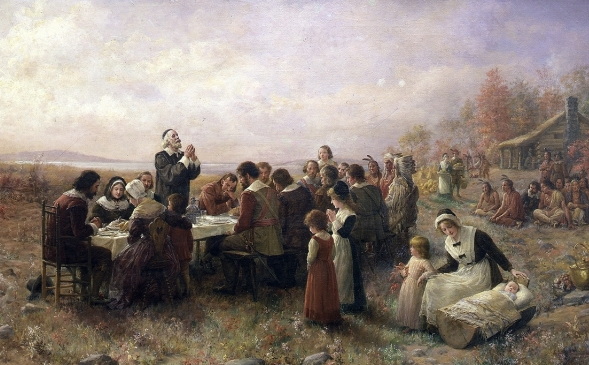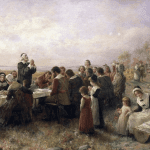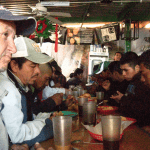 The myths and realities of Thanksgiving – The pilgrims and Native Americans who celebrated the first Thanksgiving have a lot in common with the migrants of today. This according to a recent newsletter of the Society of St. Vincent de Paul. They reprint this piece by Roxane Ramos.
The myths and realities of Thanksgiving – The pilgrims and Native Americans who celebrated the first Thanksgiving have a lot in common with the migrants of today. This according to a recent newsletter of the Society of St. Vincent de Paul. They reprint this piece by Roxane Ramos.
There are many misconceptions about the origins of the U.S. celebration of Thanksgiving. For one thing, the now- legendary feast on Plymouth Plantation in 1621 was not a celebration of thanksgiving, but an acknowledgement of a successful harvest. Nor was it a “first”—it was common to set aside a time of thanks well before this Plymouth event, though fasting more than feasting was the order of the day. There were no shoe buckles, no table or utensils, and no turkey. And the notion that the settlers extended a formal invitation to the Wampanoag residing nearby (who were more likely attracted by the revelry and inspired to contribute five deer to the party) is pure invention.
 The Myth: Paintings such as The First Thanksgiving at Plymouth (1914), by Jennie A. Brownscombe, enshrine a picture of the “first” Thanksgiving that is more sentimental than factual. – Public domain image.
The Myth: Paintings such as The First Thanksgiving at Plymouth (1914), by Jennie A. Brownscombe, enshrine a picture of the “first” Thanksgiving that is more sentimental than factual. – Public domain image.
What we do know with certainty is that before those European settlers survived the winter of 1620 and the following planting season (only 50 remained of the original 100) they survived a two-month cross- Atlantic voyage. They were, indeed, pilgrims, travelers who had journeyed a long distance, in this case, to escape persecution and pursue a better life. During this time of giving thanks and sharing abundance, the similarities between those early immigrants and today’s migrants are worth reflecting on.
Like their predecessors, modern-day migrants undertake arduous and lengthy journeys, over land and sea, and are often subject to grave dangers along the way. They are motivated by the same urges to improve one’s quality of life, find gainful livelihood, and flee oppression and violence. And upon arriving at their destination, they are pitted against further challenges that may prove insurmountable, including making a home with their families in unfamiliar, perhaps unfriendly surroundings, and suffering the pain of exile. Today, deportation is also a frequent outcome, and despite all the risks, efforts and expenditures, they may be forced to start again. In most instances, the entire endeavor is a test of survival, and a gamble on “making it” in a “new world.”
Rather than considering the migration of these contemporary pilgrims as a new phenomenon, it’s important to remember that it is simply a continuation of an ages-old human impulse to move—from farm to city, from country to country, from continent to continent—and evidence of a very understandable yearning within us for security, safety and well-being, wherever that can be found. So people migrate as they have done for millennia. The movements of those who were brave, steadfast or desperate enough to take to the road, with all its hopes and risks, have shaped all of human history and culture. It is how, in this country that has memorialized the Plymouth pilgrims’ sacrifices and perseverance in a much-treasured national holiday, the U.S. became the U.S.
 The Real Deal: Migrants gather at the KBI comedor to share a meal in a spirit of gratitude for the gifts of safety, nourishment and companionship. – Photo by Roxane Ramos.
The Real Deal: Migrants gather at the KBI comedor to share a meal in a spirit of gratitude for the gifts of safety, nourishment and companionship. – Photo by Roxane Ramos.
The other participants in that seminal celebration—the Native Americans who taught the settlers how to fish and farm—were pilgrims, too, but their migrations, often to lands far from their original homes, were not voluntary. The forced relocation of native populations is part of any full history of migration in North America, and it touches on another element of the migrant experience, namely, displacement. To leave is one part of migration, to journey another, but to at last settle into a new life in a new land, in any number of circumstances, involves a bittersweet goodbye to one’s former home, and sometimes an extended or permanent separation from loved ones. While other aspects of migration are daunting, the separation of families is heart breaking, and finding a way to keep families together fuels a big part of the current immigration debate in the U.S. Can we institute a humane and compassionate immigration policy that unites migrants with their children, parents and spouses, rather than coldly discounting those ties?
The connections we have with family, community and the wider world are at the heart of the upcoming holiday— though today, the “wider world” is, in fact, the planet—and find their origins in that 500-year-old harvest festival. The Native Americans shared their knowledge of their land, the pilgrims shared the fruits of their labor, and a satisfying, if short-lived, exchange of resources was forged. Today, we honor interdependence and express our gratitude for what we have by traveling to be with family, volunteering to help others who are not as fortunate, and gathering to share a plentiful Thanksgiving meal.
When Pope Francis recently wrote that the “Church is a pilgrim in the world,” he reminded Catholics and others around the world of the centrality of the journey. The supporters, staff, volunteers and board members of the Kino Border Initiative strive to live up to this ideal. We are all pilgrims, implicated in each other’s journeys and called to make a migration that is at once personal and collective, literal and metaphoric. We are invited to participate in that grand tradition of movement—on a road, in our hearts, perhaps outside our comfort zones—and to gather around a table that seats all of us.
(This article was first published by Passages, The KBI Newsletter, November 2014. For more information on the Kino Border Initiative and its direct aid, education, and advocacy and research programs, please go to https://www.kinoborderinitiative.org/)
UPDATE ON IMMIGRATION
By Giulio Grecchi, Tucson, Voice of the Poor, Western Region Representative
At the end of summer, the President delayed the promised administrative action on deportation relief, pledging to implement it for “after the November elections”.
Now, that the elections have taken place, it is very likely that the President will act, in spite of the continuing unfavorable political climate. [Will it ever be favorable?] Any further delay would undermine the President’s credibility to a very damaging point. We hope that action is indeed forthcoming, because every month of delay results in tens of thousands of fathers, mothers, children being deported and separated from their families. Can we continue to remain indifferent?
In September, the US Bishops, through Justice for Immigrants, conveyed to the Administration the category of migrants needing protection, which they hope the President will consider when taking action. After excluding those who have committed serious crimes, they specifically requested deportation relief for the following groups:
- Immigrants with strong community ties and equities in the United States and have lived in the United States for ten years or longer
- Parents of S. citizens
- Parents of recipients of Deferred Action for Childhood Arrivals (DACA)
- Individuals residing in the United States with already approved family and employment
Estimates of how many people are included in the above categories vary – they are probably several million.
Why do our Bishop get involved with such a controversial issue as Immigration? The reason is that undocumented migrants live in our communities, go to our churches and the Bishops, as pastors responsible for the wellbeing of their flock, have to speak-up against the injustices that undocumented migrants suffer, such as the break-up of families, or lengthy imprisonment and deportation for simply being here undocumented.
In addition, in recent weeks, Justice for Immigrants communicated another deep concern of the US Bishops: private prisons in New Mexico and Texas detaining undocumented Central America mothers and children in horrible conditions, after separation from male members of their families. These are refugees escaping targeted violence in their home countries. Overcrowding, lack of privacy, lack of recreational space, etc. are damaging for the children’s psychology and health. The Bishops have proposed letting these migrants join relatives already residing in the US or implementing community based models, as an alternatives to detention, which would be more humane, far less costly and more efficient.
Justice for Immigrants requested that we call the White House every day and urge others in your networks to call as well.
The toll-free number to use to call the White House is 1-855-589-5698 and the message suggested by Justice for Immigrants is simple: “Protect as many immigrants and their families as possible from deportation”.







In a similar vein..http://www.cruxnow.com/faith/2014/11/27/giving-thanks-for-the-stranger/